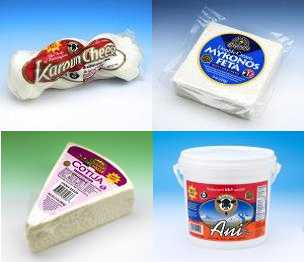Recall & Advice to Consumers, Restaurants, and Retailers
This outbreak investigation is over. However, people could continue to get sick because recalled cheeses may still be in homes, restaurants, or retail locations. Consumers, restaurants, and retailers unaware of the recall could eat, serve, or sell them. Read the Advice to Consumers, Restaurants, and Retailers.

Photos of the recalled cheeses are available.
Recall
On September 16, 2015, Karoun Dairies, Inc. voluntarily recalled [PDF – 2 pages] and ceased production of certain cheeses that the company distributes due to possible contamination with Listeria. The recall includes several brands and types of cheeses that were distributed to retail outlets in the United States. Products were sold under the following brands: Karoun, Arz, Gopi, Queso Del Valle, Central Valley Creamery, and Yanni. Products are vacuum packed, in jars or in pails. Weights vary from 5 ounces to 30 pounds.
Advice to Consumers, Restaurants, and Retailers
Consumers should not eat, restaurants should not serve, and retailers should not sell recalled cheeses [PDF – 2 pages].
- Products were sold under the following brands: Karoun, Arz, Gopi, Queso Del Valle, Central Valley Creamery, and Yanni.
- Products are vacuum packed, in jars or in pails. Weights vary from 5 ounces to 30 pounds.
- This advice is particularly important for consumers at higher risk for listeriosis, including pregnant women, adults 65 and older, and people with weakened immune systems.
| Item Name | UPC Codes | Use by Dates |
|---|---|---|
| Ackawi |
7 96252 00123 9 |
1/6/2016 |
| California | 7 96252 90030 3 | 1/5/2016 |
| Cotija |
7 96252 80037 5 |
2/29/2016 |
| Farmers Goat Fresh | 7 96252 50016 9 | 11/26/2015 |
| Fresco | 7 96252 80083 2 7 96252 80081 8 |
11/8/2015 |
| Fresh Cheese/Panela |
7 96252 03226 4 |
12/31/2015 |
| Feta |
7 96252 22004 3 |
3/7/2016 |
| Goat Milk Feta | 7 96252 50001 5 | 3/2/2016 |
| Mozzarella |
7 96252 70012 5 |
1/2/2016 |
| Paneer |
7 96252 70008 8 |
1/7/2016 |
| Queso Blanco |
7 96252 80004 7 |
|
| String Cheese |
7 96252 00019 5 |
3/16/2016 |
| Ani |
7 96252 01125 2 |
1/5/2016 |
| Nabulsi |
7 96252 03225 7 |
12/29/2016 |
| Yanni Grilling |
7 96252 90024 2 |
12/23/2015 |
Follow these steps if recalled cheeses are in your home or establishment:
- Throw the cheese away in a closed plastic bag placed in a sealed trash can. This will prevent people and animals from eating it.
- Wash the refrigerator drawer and other areas where the cheeses were stored with hot water and soap.
- Wash cutting boards, surfaces, and utensils used to cut, serve, or store cheeses. If possible, use a dishwasher; otherwise, use hot water and soap, followed by sanitizing with a solution of one tablespoon chlorine bleach added to one gallon of hot water.
- Wash your hands with warm water and soap after cleaning up.
What should I do if I ate recalled cheeses?
- If you have eaten a recalled cheese and do not have any symptoms, most experts believe that tests or treatment is not needed, even for persons at higher risk for listeriosis.
- People who develop symptoms of listeriosis after eating recalled products can consider seeking medical care and telling a health care provider about eating product that was recalled because of possible Listeria contamination. Although people can sometimes develop listeriosis up to 2 months after eating contaminated food, symptoms usually start within several days. Read more on the Information for Health Professionals page.
Who is most at risk for listeriosis?
People at higher risk for listeriosis include:
- Pregnant women and their newborns,
- Adults 65 and older, and
- People with weakened immune systems.
- Page last reviewed: September 17, 2015
- Page last updated: October 23, 2015
- Content source:


 ShareCompartir
ShareCompartir